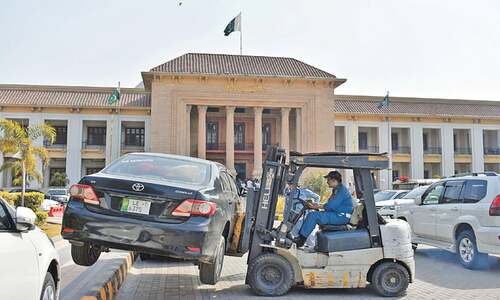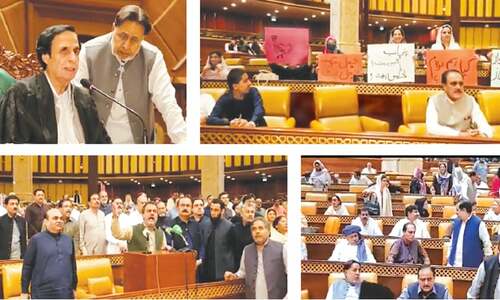• Surplus budget proposes highest development spending of Rs685bn
• Rs421.6bn set aside for school education
• Rs470bn for health
LAHORE: In line with the fiscally expansionary budgets presented by Sindh and Khyber Pakhtunkhwa, the coalition government in Punjab, led by the PML-N, also proposed a budget that seeks to significantly boost development spending, continue tax cuts and discounts, increase its subsidy bill to provide relief to the inflation-stricken people, raise taxes and levies on real estate and luxury houses and allow 15 per cent raise in salaries of civil servants.
The Punjab budget with a total outlay of more than Rs3.2 trillion, including the highest-ever development spending of Rs685 billion, proposes increased development and non-development expenditure of Rs485.26bn and Rs470bn — 10pc and 27pc higher than last year’s original estimates, respectively.
Punjab expects to receive Rs2.02tr from the federal divisible pool as its share under the National Finance Commission (NFC) Award. The total revenue has been estimated at Rs3.2tr, including the NFC share, Rs337bn as provincial tax, Rs163.5bn as provincial non-tax, Rs705.1bn as capital and Rs61.6bn as foreign project assistance. However, the total expense has been estimated at Rs3.1tr, making it a surplus budget with Rs125bn. The expense includes Rs685bn as Annual Development Programme, Rs1.7tr as current revenue and Rs704.5bn as current capital.
“The increased expenditure of Rs485.26bn includes Rs428.56bn and Rs56.70bn for non-development and development expenses, respectively. The overall education budget outlay will include Rs421.6bn for school education, Rs59.07bn for higher education, Rs1.52bn for special education and Rs3.59bn for literacy and non-formal education,” provincial minister Awais Leghari said in his budget speech.
Similarly, Rs470bn, according to Mr Leghari, have been proposed for the health sector that includes Rs296bn and Rs174.5bn for non-development and development expenditures, respectively. The minister said with a 24pc increase, Punjab expects over Rs500.5bn in provincial revenues that includes a major contribution of Rs190bn from the Punjab Revenue Authority.
From the ADP, 40pc has been allocated to the social sector, 24pc to infrastructure, 6pc to the production sector and 2pc to the services sector.
The budget also proposes a 15pc increase in salary of public sector employees, 5pc raise in the pensions of retired officials and Rs109.1bn for foreign-funded projects. It also envisages various flagship projects to be launched in 2022-23, including Rs9bn for a Road Rehabilitation Programme, Rs5bn for land acquisition for development projects, Rs1.35bn for minority development, Rs5bn for correctional facilities revamping programme, Rs4.84bn for afternoon schooling, Rs3.5bn for establishment of a nursing university and Rs1.5bn for the provision of laptops to students. Furthermore, Rs528bn has been proposed for local governments.
A wide range of subsidies and relief packages worth Rs190.58bn — in addition to the already prevalent Rs200bn subsidy on flour — are also part of the budget. The total outlay has a massive allocation of Rs1.712tr for service delivery in various sectors — 20pc higher than the ongoing FY’s about Rs1.428tr.
Among the government’s flagship initiatives during FY 2022-23, Rs100bn have been proposed for social protection initiatives (utility support programme), and Rs90bn for Sustainable Development Programme for the province, including Rs31.5bn for south Punjab alone, while the subsidies and relief package includes Rs5bn, Rs2bn, Rs17.32bn, Rs17.89bn, Rs0.44bn, Rs39.93bn, Rs2bn and Rs6bn as subsidy on ghee, Ramazan Package, agriculture, transport, e-credit facility for small farmers, free medicines, drought and plantation and environmental/climate change challenges, respectively.
The budget proposes a ban on the purchase of new vehicles, air conditioners exceeding an aggregate amount of Rs5m, medical treatment abroad on state expense, air travel through government funding, holding workshops/seminars out of public funds and upgrading of official posts/positions.
It further aims at introducing various reforms related to taxation, including extension of reduced Punjab sales tax on services for over 30 sectors, harmonisation of the Punjab Revenue Authority procedures with Federal Board of Revenue and other such authorities, 95pc exemption to electric vehicles from motor vehicle registration and token tax, revision in e-auction policy for vehicle registration marks/number, enhancement in rate of stamp duty from 1 to 2pc in urban areas and enhancement of rates of luxury houses with effect from July 1.
Minister Leghari said for the protection and uplift of minorities, Rs2.5bn has been proposed, including Rs1.35bn for a development fund and the rest for various schemes related to missing facilities at minority-populated areas, localities and worship places.
“We are reviving all projects that were either stopped or slowed down by the PTI government under politically ulterior motives. The projects we are reviving include the Pakistan Kidney and Liver Institute (PKLI) for which we are proposing Rs5bn,” Mr Leghari said.
Published in Dawn, June 16th, 2022
















































Dear visitor, the comments section is undergoing an overhaul and will return soon.